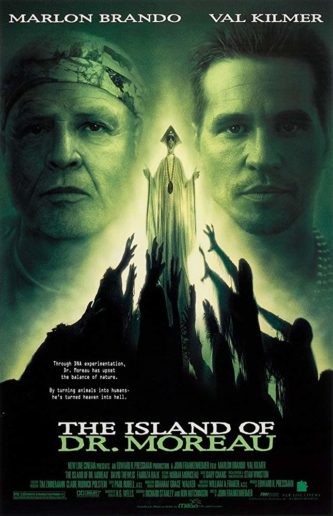 This 1996 film has been largely forgotten, but it was one of the most notorious flops of its decade. Despite recent attempts at reappraising its merits the film, I’m afraid, is indeed every bit the colossal disaster it’s been cracked up to be.
This 1996 film has been largely forgotten, but it was one of the most notorious flops of its decade. Despite recent attempts at reappraising its merits the film, I’m afraid, is indeed every bit the colossal disaster it’s been cracked up to be.
This big budget adaptation of H.G. Welles’ classic novel (previously adapted in the classic ISLAND OF LOST SOULS in 1933, and again, albeit much less auspiciously, in 1977) was a longtime labor of love by British filmmaker Richard Stanley, of HARDWARE and DUST DEVIL fame. After several years of preproduction the film was taken away from Stanley by New Line Cinema, who, Stanley claims, were put off by his gory and unorthodox treatment (inspired, allegedly, by the films of Italy’s Lucio Fulci).
It was given over to the late John Frankenheimer, a 40-plus year veteran who really should have known better. Stanley, who retained a co-screenwriting credit, retaliated by getting himself hired onto the production as an extra, and reporting on his none-too-flattering findings in the pages of Fangoria. Stanley’s labors on MOREAU are also the subject of the 2014 documentary LOST SOUL.
The finished film was, unsurprisingly, a disaster in every respect. Richard Stanley’s career never recovered from it, and neither, for that matter, did Frankenheimer’s.
Edward, a naïve UN ambassador, finds himself deposited on a secluded island after his ship sinks and he ends up in a fight to the death with a fellow survivor—luckily Edward wins! He’s rescued by the highly eccentric Montgomery, who takes him back to the island compound controlled by his master, one Dr. Moreau, a mad scientist who got rich by inventing velcro.
Edward is struck by Moreau’s invention and ingenuity, as well as the sight of Moreau’s attractive daughter Aissa, who is apparently the result of an unholy experiment by her father. Other such experiments litter the island in the form of half-human animals, all governed by a half-explained law created by Moreau that when broken results in pain emitted by remote controlled implants.
But it seems Moreau’s creations have had enough of his autocratic rule. After figuring out how to identify and remove Moreau’s implants, the critters revolt and kill their master, which throws his island hierarchy into disarray. Montgomery tries to take Moreau’s place but is killed himself, leaving Edward and Aissa to deal with the out-of-control creatures on their own…
What’s wrong with this film? Just about everything: it’s uninvolving, tacky and incoherent. It may have been a big budgeted production with state-of-the-art digital effects by the great Stan Winston (it was actually called a “game changer” in its revolutionary use of CGI), but it looks trashy and low budget. None of the creatures on display (including the one played by the world’s smallest man) are too impressive, and John Frankenheimer’s precise and occasionally hallucinatory visual style, which did wonders for classics like THE MANCHURIAN CANDIDATE and SECONDS, does nothing to liven up the proceedings.
One of the biggest problems is the performance of Marlon Brando as the titular Dr. Moreau, which is every bit as hammy and unconvincing as can be imagined. Not that I can blame Brando for his disinterested work, as the script is so half-baked. Ditto the make-up: who can forget the altogether ridiculous sight of Brando in kabuki-style plaster-white make-up (which is somehow explained away as sunscreen)? Val Kilmer as Moreau’s eccentric sidekick doesn’t fare much better; note the blue armband he wears throughout, which is never explained but was apparently something Kilmer, for reasons no-one but him really knows, insisted on. (It’s wonder that when Val Kilmer wrapped Frankenheimer is said to have yelled “get that bastard off my set!”)
Whether Richard Stanley’s intended version of this film would have been much better than Frankenheimer’s, as Stanley and much of the horror community seem to believe, is negligible, but it couldn’t possibly have been any worse!
Vital Statistics
THE ISLAND OF DR. MOREAU
New Line Cinema
Director: John Frankenheimer
Producer: Edward R. Pressman
Screenplay: Richard Stanley, Ron Hutchinson
(Based on a novel by H.G. Wells)
Cinematography: William A. Fraker
Editing: Paul Rubell, Adam P. Scott
Cast: Marlon Brando, Val Kilmer, David Thewlis, Fairuza Balk, Ron Perlman, Daniel Rigney, Temuera Morrison, Nelson de la Rosa, Peter Elliott, Mark Dacascos, Marco Hofschneier, Miguel Lopez, Neil Young
